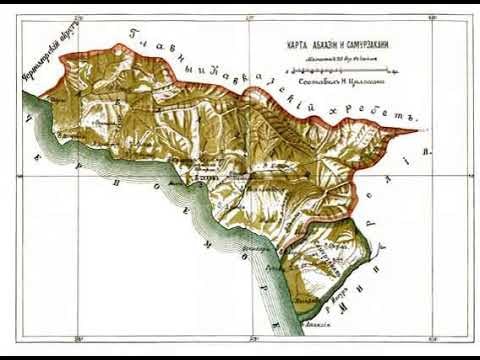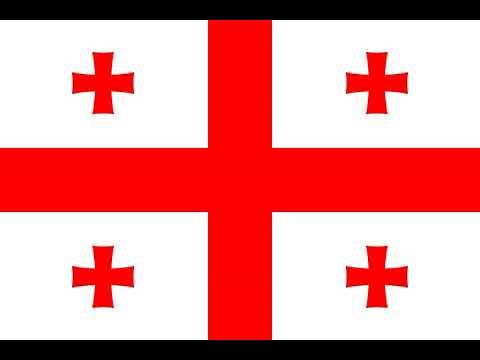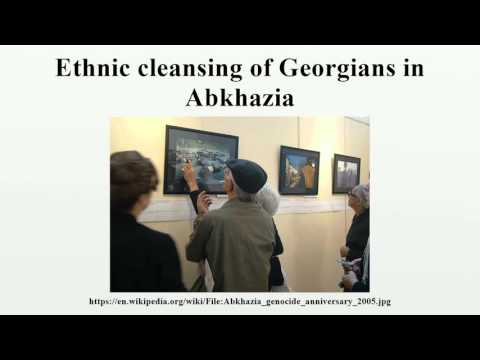Abkhazia | Wikipedia audio article
This is an audio version of the Wikipedia Article:
Abkhazia
Listening is a more natural way of learning, when compared to reading. Written language only began at around 3200 BC, but spoken language has existed long ago.
Learning by listening is a great way to:
- increases imagination and understanding
- improves your listening skills
- improves your own spoken accent
- learn while on the move
- reduce eye strain
Now learn the vast amount of general knowledge available on Wikipedia through audio (audio article). You could even learn subconsciously by playing the audio while you are sleeping! If you are planning to listen a lot, you could try using a bone conduction headphone, or a standard speaker instead of an earphone.
You can find other Wikipedia audio articles too at:
/ @wikipediatts983
You can upload your own Wikipedia articles through:
https://github.com/nodef/wikipedia-tts
"The only true wisdom is in knowing you know nothing."
- Socrates
SUMMARY
=======
Abkhazia ( (listen); Abkhazian: Аҧсны́, translit. Apsny [apʰsˈnɨ]; Georgian: აფხაზეთი Apxazeti [ɑpʰxɑzɛtʰi]; Russian: Абха́зия, tr. Abházija, IPA: [ɐˈpxazʲɪjə]), officially the Republic of Abkhazia, is a de facto and partially recognized republic on the eastern coast of the Black Sea, south of the Greater Caucasus mountains, in northwestern Georgia. It covers 8,660 square kilometres (3,340 sq mi) and has a population of around 240,000. Its capital is Sukhumi. The separatist Abkhazian polity, formally the Republic of Abkhazia, is recognised as a state by Russia, Venezuela, Nicaragua, Nauru and Syria. While Georgia lacks control over Abkhazia, the Georgian government and most United Nations member states legally consider Abkhazia part of Georgia, whose constitution designates the area as the Autonomous Republic of Abkhazia.
The status of Abkhazia is a central issue of the Georgian–Abkhazian conflict and Georgia–Russia relations. The region had autonomy within Soviet Georgia at the time when the Soviet Union began to disintegrate in the late 1980s. Simmering ethnic tensions between the Abkhaz—the region's "titular ethnicity"—and Georgians—the largest single ethnic group at that time—culminated in the 1992–1993 War in Abkhazia which resulted in Georgia's loss of control of most of Abkhazia, the de facto independence of Abkhazia, and the ethnic cleansing of Georgians from Abkhazia. Despite the 1994 ceasefire agreement and years of negotiations, the dispute remains unresolved. The long-term presence of a United Nations Observer Mission and a Russian-led Commonwealth of Independent States (CIS) peacekeeping force failed to prevent the flare-up of violence on several occasions. In August 2008, Abkhaz forces fought against Georgian forces during the Russo-Georgian War, which led to the formal recognition of Abkhazia by Russia, the annulment of the 1994 ceasefire agreement, and the termination of the UN mission. On 28 August 2008, the Parliament of Georgia declared Abkhazia a Russian-occupied territory, a stance supported by the vast majority of the international community.
wikipedia tts-ის სხვა ვიდეოები
 05:14
05:14
Principality of Svaneti | Wikipedia audio article
 24:42
24:42
Eduard Shevardnadze | Wikipedia audio article
 00:59
00:59
Bolnisi cross | Wikipedia audio article
 01:08
01:08
Georgian Stock Exchange | Wikipedia audio article
 02:29
02:29
Lazica | Wikipedia audio article
 04:34
04:34
Akhalkalaki | Wikipedia audio article
 00:51
00:51
Samachablo | Wikipedia audio article
 01:34
01:34
Dzala ertobashia | Wikipedia audio article

მსგავსი ვიდეოები

Samurzakano | Wikipedia audio article
wikipedia tts

Mkhare | Wikipedia audio article
wikipedia tts

Mingrelian language | Wikipedia audio article
wikipedia tts

Georgia (country) | Wikipedia audio article
wikipedia tts

Ethnic cleansing of Georgians in Abkhazia
WikiAudio

History of Kartvelians | Kartveli Tarihi
Kayra Atakan

აფხაზეთის მთები / Mountains of Abkhazia
ქართული ხალხური სიმღერა

1832 Georgian plot
WikiReader